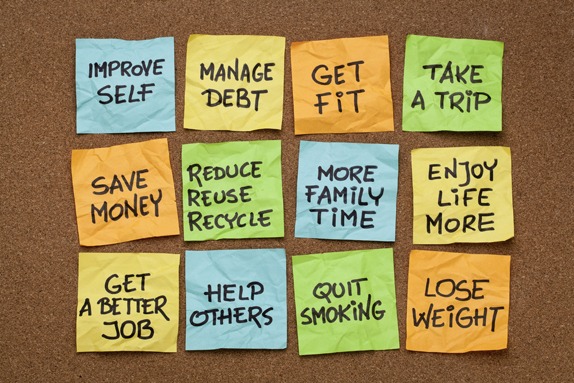Do New Year’s resolutions work?
It’s that time of the year again; the one-month free trial is up! We have people celebrating the fact that New Year’s indeed falls on February 1st as a little internet joke; I must admit I couldn’t wait for January to end. But upon further reflection, why am I hoping for time to pass rapidly to escape the shackles of the pressures January holds? I can also break free from these manufactured pressures myself and act accordingly.
New Year’s resolutions are worth making as they allow us to jot things down and thus become more intentional, even if we don’t follow through with every resolution. The problems arise when we don’t allow space for editing resolutions as time passes. We’re not superhuman. Sometimes circumstances change, and that’s okay.
I was once a regular gym go-er, and the next thing you know, I was ill for two weeks and lost the habit. It can often feel paralysing when trying to get back into the game. I believe this is rooted in a perfectionist mindset since I find myself justifying not going back because “It’s not the right day, there’s only an hour before sunset”; “I want to start again when it’s daytime”; then the next day I tell myself “I still haven’t eaten, I should eat before I go to the gym, but then it will be too late to go because it’ll dark and cold”. I feel I’m self-sabotaging because starting again when it’s dark won’t work for me, but am I actively avoiding the dark? Am I even afraid of the dark? Not even. It’s almost as though I unknowingly yet knowingly wait for the dark to encompass the sky and thus use it as an excuse.
If we fail to meet our expectations, guilt-induced feelings can be tied to our self-worth
A study in the US found that Gen Z are most concerned with mental health; the survey found that a whopping 50 per cent of people aged 18-25 made resolutions to improve their mental well-being, which can often be linked to heightened social media usage. A another study cites Gen Z as the “least likely [generation] to hold themselves accountable with their resolutions, implying that they need outside motivation”.
The need to detoxify social media is at an all-time high. Interestingly, in recent years, social media has provided a space for reducing the stigma associated with mental illness, and conversations surrounding mental health issues have become normalised.
Could this new-found awareness play a part in the decline in ‘resolution permanence’? As we delve deeper into our psyche, the pressure to improve increases. If we fail to meet our expectations, guilt-induced feelings can be tied to our self-worth.
With the start of a new year, we feel a renewed sense of motivation to improve ourselves throughout the year. That heightened awareness and motivation can just as easily lead to increased pressure, which can often cause us to quit entirely – resulting in a knockoff effect. It is tempting to change for the better suddenly, but this obsession with wanting to do so drastically needs to be revised.
While it’s good to appreciate the positives, it is essential to recognise how we may fall victim to the negatives and how much this can impact real, quotidian life. For one, there appears to be widespread misinformation online, perpetuating myths and misconceptions. Paradoxical opinions are everywhere, forming an anxious atmosphere amongst Gen Z (mainly). Their relative lack of experience in critically navigating through data and a lack of real-life guidance from trusted mentors doesn’t do anyone justice.
The trick lies in a realistic and self-compassionate attitude
It’s as if there are two types of misinformation – that I just depicted and the constant consumption of social media. The continuous barrage of curated content on platforms such as TikTok can be overwhelming, resulting in viral phenomena such as ‘that girl’ or ‘clean girl’, among many others. This is ultimately misinformation too, as there’s an emphasis on changing oneself based on the current social media standard or ‘aesthetic’, which is ever-changing. Improving your well-being and physicality is tied to aesthetics in one way or another.
Don’t get me wrong, trends and unrealistic standards have existed for as long as I can remember, but part of me misses how slow new ones would appear (in comparison), leaving enough time and choice for people to opt out in a sense. Being aware of such phenomena despite not being a TikTok user makes me wonder just how paralysing it must be to be an avid user of such a rapidly changing platform. How does one keep up and remain sane? With the added pressure of social media influence, it’s no wonder New Year’s resolutions are much more challenging to maintain nowadays.
At the heart of the issue is the need to reduce reliance on any external factors, social media or not. It is the most sustainable way to upkeep New Year’s resolutions, considering the trick lies in a realistic and self-compassionate attitude. It may be good to note that involving others is a good idea, for example, carefully picking a person or a few to share resolutions with to provide accountability and encouragement on both sides.
Reflecting and being mindful is essential as we move forward into the new year. Whether it be a solitary process or not, resolutions aligned with personal and intrinsic values are far more likely to be pursued consistently and approached with compassion. Setbacks are a natural part of life and the ‘self-growth’ process; no transformation is smooth after all. Think of the cocoon-to-butterfly process.

Comments